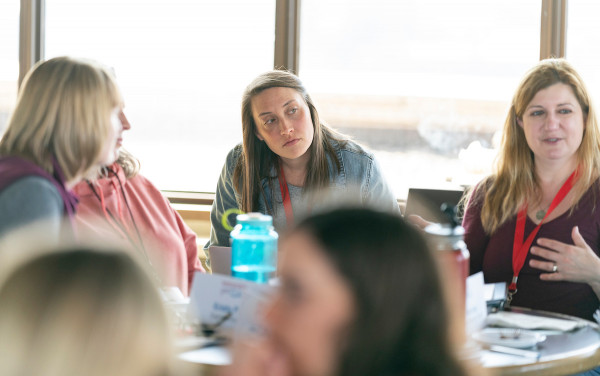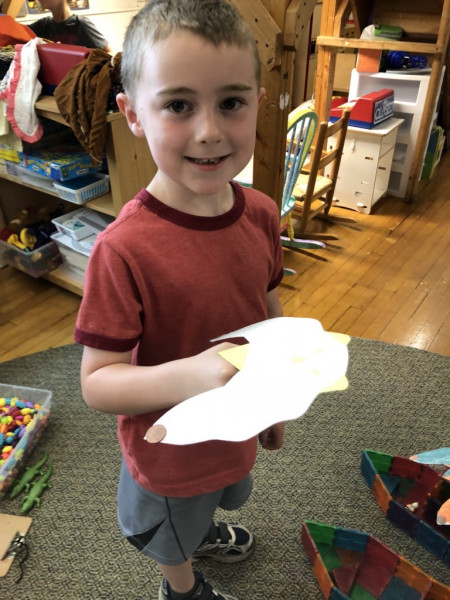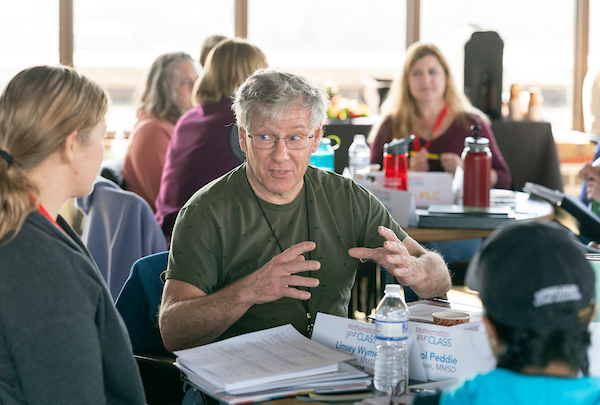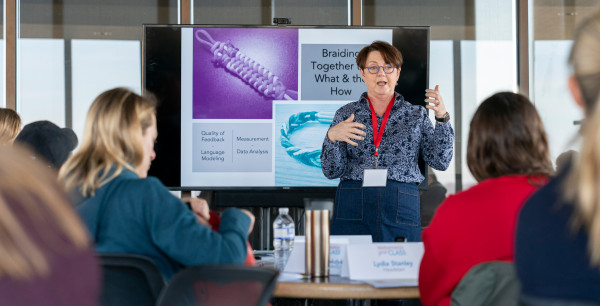UW Researchers Partner with Madison School District to Sharpen 4K Teaching
'Mathematize Your CLASS' offers free, customized training to strengthen engagement strategies around math
August 21, 2020 | By Karen Rivedal, WCER Communications

Culleen Witthuhn, MMSD's director of early learning, presents a PD session to 4K teachers in part of a two-year MEP project.
The Madison Education Partnership (MEP) will release a report by the end of October detailing what worked and what didn’t at the close of a two-year project to help teachers in the Madison Metropolitan School District’s four-year-old kindergarten (4K) program strengthen the depth and rigor of their instruction, especially in math.
The project, funded by a $400,000 federal grant, culminated with the delivery of research-based professional development (PD) sessions to around 20 Madison 4K teachers on four Saturdays throughout the school year that ended in June.
“It was well thought-out and prepared with educators’ needs in mind,” says participant Heidi Schultz, a 4K teacher from Falk Elementary with over 20 years of experience in early childhood learning. “The instructors gave a variety of learning opportunities to all participants, and shared real and tangible ideas that we could incorporate into our own classroom instruction and design.”
Titled “Mathematize Your CLASS,” the program was presented and led by the school district’s Director of Early Learning Culleen Witthuhn and by Beth Graue, a UW-Madison education professor and former kindergarten teacher who now directs the university’s Center for Research on Early Childhood Education (CRECE). A team of five 4K teachers helped design the sessions.
The team chose a PD approach pairing instructional support strategies with early math content, believing that “if teachers had deep content knowledge and pedagogical knowledge to support learning, they could better support children,” Graue says.
Training sessions offered in-person, online
Schultz and 19 other 4K teachers gathered at the Goodman Community Center in Madison for the first five-hour session and at the School of Education’s Wisconsin Center for Education Research (WCER) for the next two – on Oct. 5, Jan. 18 and March 7 -- with the last session, on April 25, offered online because of COVID-19.

About 20 Madison 4K teachers volunteered to spend four Saturdays learning better ways to present math and other concepts as part of a MEP research project.
The training was custom-designed to recognize the strengths and meet the needs of Madison 4K teachers, through a series of 4K classroom observations and focus groups that took place the year prior in phase one of the project, led overall by MEP, a research-practice partnership between MMSD and WCER.
This comprehensive review of the quality of 4K instruction produced a report and took place across the program’s 26 school-based sites and 27 community sites – including 21 early care and education (ECE) centers and six federal Head Start locations. Together, the 53 sites provide 4K programming for about 2,000 students.
“What we’re trying to do is to equalize the professional development opportunities across groups, and have opportunities for teachers from all those groups to get to know each other and the strengths and challenges of their practices,” Graue says. “That’s one of the things I’m most proud of -- that relationship-building and the sharing of some pretty considerable intellectual knowledge that we achieved.”

4K students learn how to share, problem-solve and use fine motor skills while playing in Lapham Elementary School’s Sand Table.
“I took away a wealth of information that I will be able to use in my practice,” Schultz says. “I also greatly enjoyed being able to converse with participants from other area early childhood sites.”
Offered in morning or afternoon sessions, the district’s three-hour, play-based 4K classes function as pre-kindergarten enrichment opportunities designed to help students learn the fundamentals of literacy and numeracy.
They also serve as a bridge between home and school, providing a supportive space where students learn “how to do school,” according to Beth Vaade, the district co-director of MEP.
In planning the PD sessions, researchers found the focus group discussions were particularly appreciated.
“We did focus groups with practicing teachers to actually ask teachers what they wanted and what they needed,” Graue says. “That doesn’t (ordinarily) happen ever.”
Strengths, challenges identified in 4K program
To help identify teacher attributes to focus on, classroom observers from the research group employed an evidence-based, nationally adopted observation tool developed at the University of Virginia called the Classroom Assessment Scoring System (CLASS).
It identifies three broad domains that affect the quality of teacher-student interactions: emotional support, classroom organization and instructional support. It works to rate the quality of teacher performance in these areas on a scale from 1-7.
Observers using CLASS found Madison 4K teachers do a good job of providing emotional support to their students and maintaining a positive classroom climate, with identified strengths such as using an appropriate tone of voice, asking questions that build rapport with students, and purposefully fostering a sense of belonging. They also run their classrooms smoothly, the tool found, with structures in place to encourage autonomous learning.
But there was room for improvement in teachers’ delivery of instructional support, defined as ways teachers can extend children’s thinking, problem-solving and conversational skills. It revolves around how a teacher develops concepts, models high-quality language and provides quality feedback to students.
Good instructional support can be the difference between a teacher asking a student one question in class and then immediately moving to the next student, “rather than having an extended exchange where you can really dig deep into what a child knows,” Witthuhn says. “It’s about moving away from rote skills to engaging in concept thinking and development.”
Learning to have fun with math

A boy learns about distributed weight in MMSD's 4K program at New Morning Nursing School in Madison.
The challenges around instructional support is a national issue in early childhood teaching, Graue notes, as is the other main opportunity for growth the research group identified in Madison’s program – math instruction. Nationwide, math tends to give 4K teachers – and often their students’ families – the heebie-jeebies.
“In the early learning world, the teachers are really focusing around great books for learning literacy skills, and math is not at the forefront of that,” Witthuhn says. “Math is one of the areas 4K students come in scoring the lowest, and they leave higher, but they are still low. There is this stigma around the subject of math, and teachers can be afraid to teach it.”
“There’s a discomfort with math,” agrees Eric Grodsky, a professor of sociology and educational policy studies, co-director of MEP for WCER and principal investigator on the PD project.
Main math topics covered in the four sessions were numbering/counting, spatial relations and shapes, measurement and data, and operations, or addition and subtraction. Methods of instructional support around these topics also were covered to advance the pedagogical element.
“This approach is trying to ensure that the activities (in 4K classes) are not only fun, but they’re really rich in terms of the content, and that the teacher is then able to use the instructional supports that we’re covering to get kids to interact in ways that help them learn,” Graue says.
Teachers and researchers also built, with the help of the project’s graduate students, an online resource known as an “early math activity matrix” that participants hope all of the district's 4K teachers get to use. The query-driven matrix matches up desired academic goals with downloadable play activities that can be used to achieve each objective.
“What we’re doing is bringing in these really great academic pieces that you can do in a really great play-based environment,” Witthuhn says.
Building connections to conquer teacher isolation
Another goal of the PD pilot project was “building a community for the 4K teachers,” who can be professionally isolated. They typically are the only 4K teacher based in a given school or the only one working at any given time at the community sites.

Teacher participants in a professional development session at WCER enjoy a rare opportunity to discuss concepts and practices in 4K education together.
“4K teachers are like an island of their own,” Witthuhn says. “They have to go somewhere else to collaborate with someone about their own level. A lot of what the teachers are requesting are things like being able to see one another’s classrooms and being able to reflect and talk about that.”
Witthuhn says she will explore ways to provide this kind of professional learning community for all 4K teachers – who number nearly 80 -- in the district. Researchers also are counting on the session participants to evangelize about what they learned, as Witthuhn works to ramp up as much of the project's PD offerings as budget and other needs allow.
“I’m always thinking about connections,” Witthuhn says. “How does this connect to our daily work and how can I make something like this (research-based) piece happen within our system? This opportunity for the school district to be able to work with UW−Madison in this way is really exciting.”
Grodsky notes the research-practice relationship “goes both ways.”
“The work MEP does is fundamentally about bringing research and practice together,” he says. “So just as much as Culleen’s appreciative of the insights and opportunities she has when she’s working with us, for us to have an understanding of how teachers experienced this, what their barriers are, what their insights are to improving our understanding of what’s working, is invaluable. The theory (developed by researchers) is updated based on the practice of teachers.”

CRECE Director Beth Graue covers research-based concepts in 4K education during free training for local teachers March 7 at WCER.
“We would be working in a vacuum, if we were just bringing theory to ourselves,” Graue agrees. “In working with Culleen, I’ve been able to learn connections to practice-based things that I’m too far away from being a teacher to be able to remember.”
Teacher participants in the PD series now are turning in final projects, MEP program manager Amanda Kruger reports, while the research team catalogues materials and prepares to publish a descriptive report about the PD series.
Funding for MEP's PD project came from the Institute of Education Sciences (IES), the major grant-making arm of the U.S. Dept. of Education (#R305H180053).


